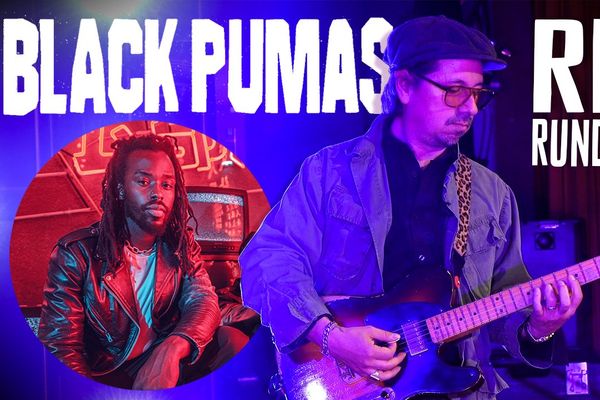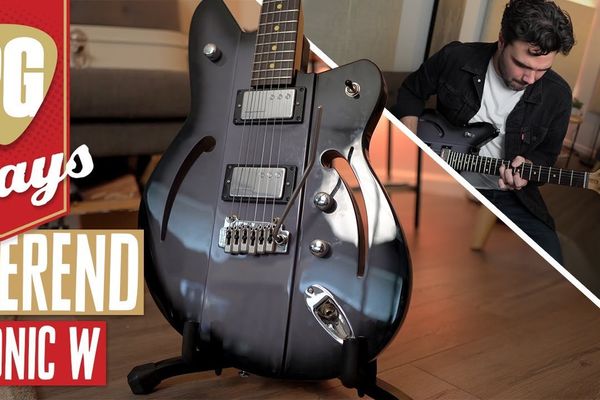Richie Kotzen talks about his stripped-down signal chain and songwriting
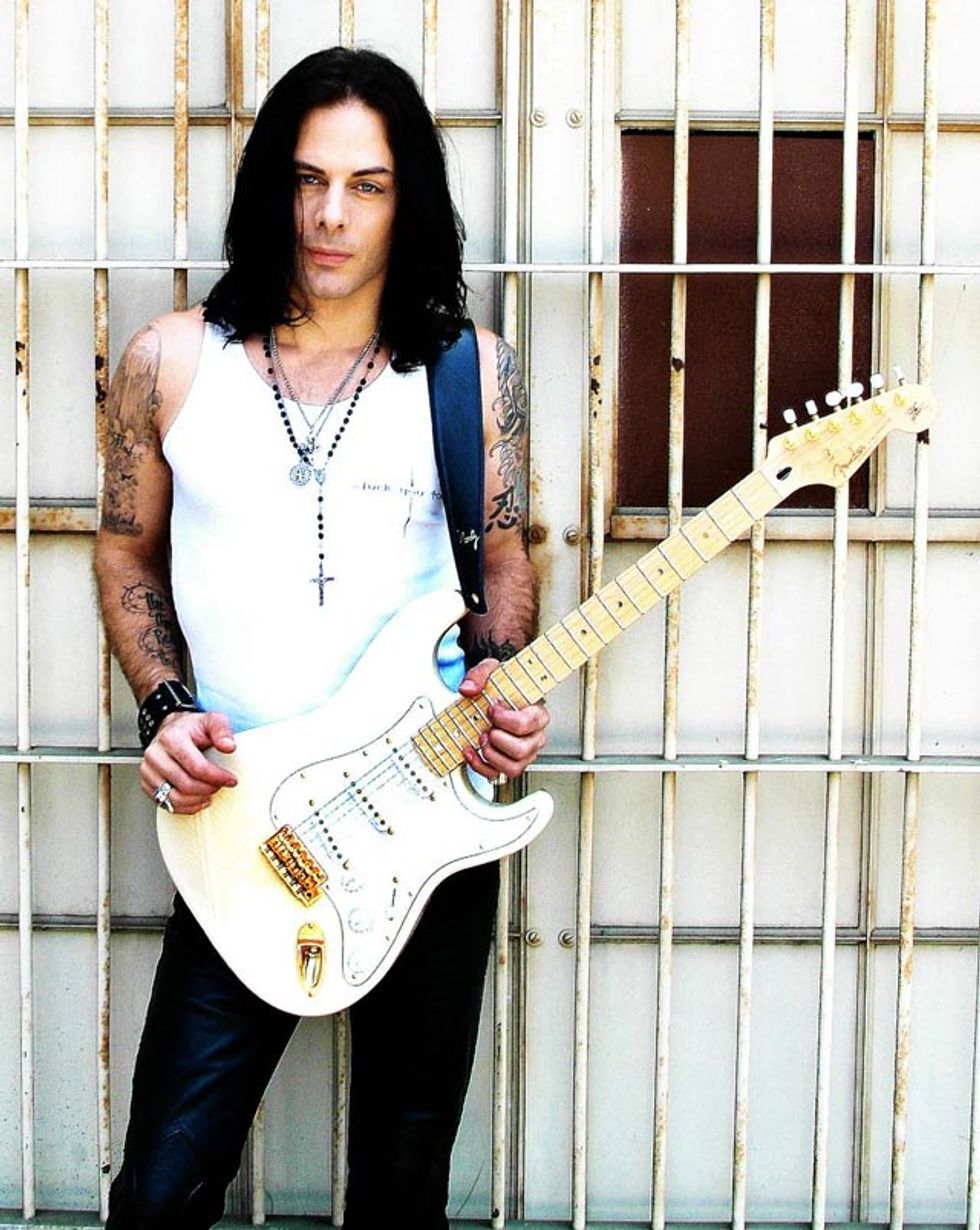 |
|
To add insult to injury, he’s no poser. He really plays the shit out of the guitar! He plays jaw-dropping stuff and has a freakish left hand. Kotzen signed his first record deal as a teenager, toured and recorded with bassist extraordinaire Stanley Clarke, and replaced the notorious Paul Gilbert in Mr. Big. Yes, he’s that good. Solo records poured out of him as well as shred-fusion projects with Greg Howe. He also owns his own commercial recording studio, gets cool gear for free and writes the kind of songs that make you wish you had written them. He’s nice guy too. Damn you, Richie Kotzen.
Kotzen gets lumped in with the shred guys, but his songwriting style falls more into the blue-eyed soul/rock category. He’s recorded rock-fusion and shred, but it’s his bluesy singing style and soulful melodies that are the focal point of his contemporary work. He’s a tuneful, introspective guy who writes accessible, radio-friendly songs with a rock edge. He puts on the type of show that our guitar-obsessed readers could drag their wives or girlfriends to and be assured they’d have a good time. I caught up with Kotzen just before the Los Angeles leg of the Guitar Generation tour.
I’m coming to your gig tomorrow night with George Lynch and Paul Gilbert. I’m expecting unadulterated mayhem.
[Laughing] We did our first one in San Diego the other night and it was a lot of fun. I really like Paul a lot. Not only the way he plays, but personally. He’s just a great guy. We have a fun time in the jam. George too. I don’t know George and I don’t feel as familiar with George as I do Paul, because I was in Mr. Big and I spent a lot of time listening to Paul, but it’s just a cool hang. I wish this tour could develop into something that was more than just three shows.
Me too. It sounds like a hoot.
Right now as it stands we’re only doing three shows. We’re talking about moving it toward the fall. The last show is in Anaheim.
You guys are obviously doing individual sets and a jam at the end. Tell me about it.
I go up first, George does his thing, then Paul. Then we do the jam.
What kinds of tunes are you jamming on?
We do “Snortin’ Whiskey” by Pat Travers which was one of my suggestions because it’s one that I used to do and it’s a fun guitar tune. Paul suggested “Light My Fire.”
[Laughing]
It’s really cool! It’s funny. The minute I got the email I said, “Oh! I know why he wants to do this -- it’s because he learned the organ part in the beginning on guitar.” Sure enough, he did and it sounds really cool. He sings it and does it really great. We’re also covering “Jumpin’ Jack Flash” and “30 Days In The Hole.”
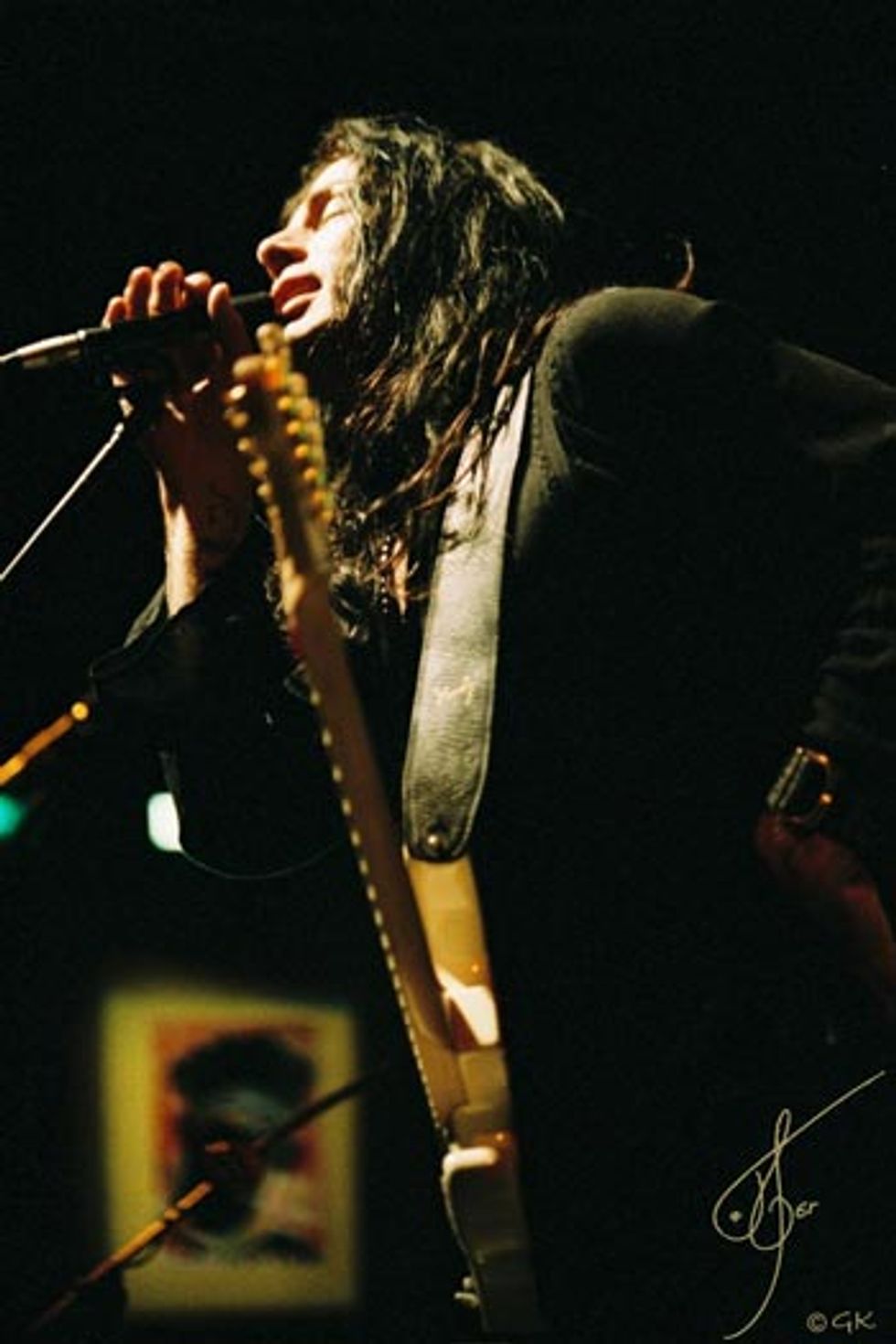 I can’t wait to hear you guys. By the way, your Live in Sao Paulo disc is truly awesome. I love the playing and the production. Great crowd response.
I can’t wait to hear you guys. By the way, your Live in Sao Paulo disc is truly awesome. I love the playing and the production. Great crowd response. Thank you. There’s so much stuff of me on YouTube. I don’t watch myself anymore because I have a hard time with it. I know when I’m at my best and I know when I’m at my worst. I feel like I’m a good judge of me. What happens is that you have thousands of videos and naturally I want to be shown at my best. I feel like Live in Sao Paulo was the first time I was recorded properly where I really was at my best.
That’s what makes the record special to me. Here’s a proper recording and decent video footage. It’s not super high quality video footage but it’s good enough to see what’s going on. It’s the first time somebody actually captured me doing what I do, where all the elements came together. The band played great, I played as good as I could, I sang as well as I was capable of at that time and the audience was into it. I’m really excited about the fact that this exists. If I wouldn’t have dug it, I wouldn’t have released it. At this point I don’t put anything out that I don’t stand behind.
People go on and on about your soloing abilities but I don’t think enough attention is paid to your rhythm playing, especially while you’re singing. Is that something you had to pay a lot of attention to?
No. I really try not to work too hard. [Laughing] I don’t like that laboring feeling. I had that laboring feeling when I was young and learning to play the guitar. I got to a point where I just wanted to make music. Where the laboring process comes is I might write something or hear something that I can’t quite play. That’s when I have to sit and practice it. Live, what happens is that the rhythm guitar fits under the lead vocal and because I’m doing both, it makes it really easy to do.
Some guitar players that don’t sing might have to think more about how to play rhythm guitar against the singer. Because I’m the singer, it’s forcing my guitar to do what it needs to do. It’s more of a natural thing. Occasionally I’ll write a song where the rhythm guitar part is hard to play at the same time that I’m singing the lead vocal. Then I have to practice. I have to figure out how to do it. In general it’s kind of an all-inclusive thing.
Your rhythm sections seem to have that natural rhythmic flow as well.
Well you gotta rehearse the band. I can’t teach them telepathy but even in that, I don’t like to spend a lot of time rehearsing. I expect the band guys to come in, know the songs, play’em and know them well enough so that if I change something on the spot, they can adapt. A lot of that goes on in my set.
Your guitar rig is a natural extension of your music as well. It’s very low maintenance. You’re one of the few guys in your genre that uses your guitar’s volume control old school to get all your sounds.
As far as going from clean to dirty, yeah. I did a tour with Uli Jon Roth. We were doing a Hendrix tribute tour in Europe. I was really getting frustrated with having a boost pedal in front of me so I got rid of it. I had no pedals. Since then I found a company that makes a guitar tuner that lives in your guitar. It has a nine-volt battery, potentiometer and a LED circuit that’s on top of the guitar. It takes up virtually no space in your guitar.
It’s inside your guitar?
Totally. It’s called N-Tune. I emailed these guys. I told them I wanted to try out their product. I told them who I was and they ignored me. They sent me nothing! No email, nothing! [Laughing] I went and bought it in a store. I’m still talking about it because it’s that good. I’m saying that partly to show how they don’t really give a shit who I am, which is fine, but I’m also saying that it’s a great product. It’s kind of an unofficial endorsement [Laughing]. I have them in both of my main guitars.
Do you still plug directly into the head of your Cornford RK100 Richie Kotzen Signature Model?
No. That’s what I use to do. Recently I did this thing with this company called Zoom. They have digital pedals and they made a signature model for John 5 and George Lynch. They asked me if I was interested. Naturally my first reaction was, “I don’t really use pedals.” But I was thinking that I wish I had a really good delay pedal and a good reverb. So what I did was that I programmed a bunch of settings for them that I thought were musical and usable. These were settings that I would use in a live situation.
Now I’m using the pedal live, but I don’t use it the way most guys would. Instead of it going in series and using it on the floor, I’ve got it in parallel. It lives on top of my amp. There are two tiny cables going into the effects loop. I’m mainly using it as a reverb and as a delay. The great thing is that it changes my tone in no way whatsoever. I still get the exact same tone. I can plug it in and unplug it and I can’t hear the difference. The overdrive is still coming from the Cornford. Now I’ve got a great reverb and I’ve got a delay with a tap button on it. The reason it’s on my amp is so I can walk over and tap the tap button and make the delay be in time with the song.
Wow, your own custom multi-effects pedal. Very cool.
Totally. I’ve programmed all kinds of settings. There are reverb and delays but there are also flangers and choruses in there and a couple of modulation things. I made up some auto wah-wah settings that I thought were cool.
Did you use any of these effects on Live in Sao Paulo?
No. Live in Sao Paulo was done before I had this pedal. The reality of the live disc is that I didn’t even have the Cornford for that. I was in Sao Paulo and they couldn’t get my amp down there so I was playing through a Marshall JCM800. I used a Japanese overdrive pedal from this company called Sobot.
Tone is in the hands.
I agree with that. The thing about gear is that if I have a shitty amp or a good amp, in general I’m still going to sound like me. I’m going to play stuff that I would play. If I have a great amp, it’s going to make it easier for me to play. It’s going to make it easier for me to express myself, so therefore I’m going to play better.
The real core of what you’re doing of course comes out of your hands, but so many times you can plug through an amp that’s just god-awful. You gotta roll with it. You gotta do what the amp is capable of doing because if you try to do everything and the amp is only capable of some things, you’re not going to be able to do what you gotta do.
Do you set your amp up with your guitar’s volume low for a clean rhythm tone, then roll your volume up to get a lead tone?
I do the opposite of that. I set my lead tone. I set the guitar full up to make sure I got a great lead tone, then I roll it back and find the sweet spot where my rhythm tone is going to be.
Your songwriting is more personal than the idea of having influences that you wear on your sleeve. I’m thinking of a song like “Remember.”
The songs come from different places. I wrote that song in 2004 and to be honest I don’t remember the conditions of which it was that I wrote the song, but I know the sentiment. I can’t say that right now I’m singing that song to someone because I’m not. But the situation is real and it was probably a real situation for me at the time that I wrote it. Those kinds of songs write themselves because they’re coming from a personal place. It’s that moment and you can’t predict it.
Do you ever get writer’s block?
I don’t believe in the notion of writer’s block. You write when there’s something to be written and it comes through you. You allow it to happen because you’re in that comfortable place and you’re inspired. You can’t force yourself to write a song.
What if you have nothing to say? Isn’t that writer’s block?
No. It just means you have nothing to say and there’s nothing to write. You’re not a writer at that point. You’re only a writer when you’re writing. When you say you’re having writer’s block, you’re saying, “I want to have something say.” I don’t walk around saying I’m a writer. It’s only when I’m writing a song that I’m actually a writer. When I have the inspiration or hear a melody, then I’ll go to the piano. If it turns into a song then it’s meant to be.
My point is when you pick up your guitar and you say to yourself, “I want to write a song,” and you go to write it and there’s nothing to write, then you say, “I have writer’s block.” That’s what I’m talking about. You’re going about it the wrong way. The time to write the song is when the song comes through you.
So you won’t write unless you have something to say.
I don’t write unless the song writes me! It comes out! [Laughing] I don’t say I have writer’s block. I say, “There’s nothing to be written.” I hate when people get hung up on that because they feel like they’re failing. No, you just have to wait until something happens significant enough for you to feel compelled to write about it.
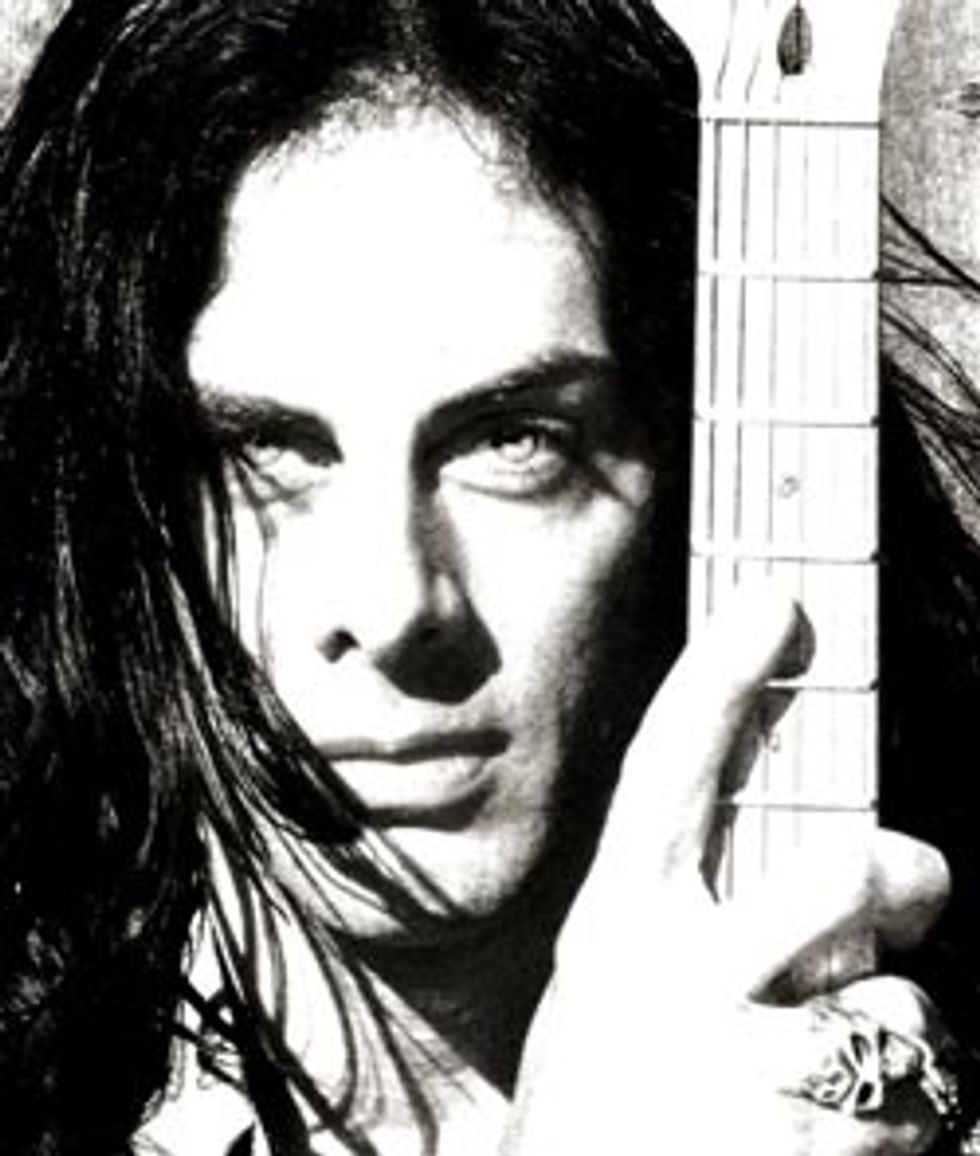 Have you written craptastic songs that you refuse to show to anyone?
Have you written craptastic songs that you refuse to show to anyone? Absolutely.
[Laughing]
Every song that I’ve written that’s never been on one of my records is a bad song and there are a lot of them. I don’t write songs anymore that I think are bad because I never finish them. I only finish something that needs to be finished and then it usually ends up on a record.
Ten years ago I would be doing a record and force myself to write something and end up with… I don’t know what the hell it was. I don’t do that so much anymore. I stopped doing that on Into The Black. Maybe even on Get Up, but definitely on In To The Black. It was the first time I ever made a record where it was like... this isn’t really a record. I was just writing and recording songs. Eventually I had enough songs for a record and I put the record out. It’s a fairly recent feeling for me but it’s something that’s important because all the best songs that I have are all songs that just came out.
So to be clear, you don’t write songs just to write songs. You write when you’re inspired. You never write as an exercise.
No.
I’m thinking of the song “Shine” that you wrote for Mr. Big. At some point didn’t you say to yourself, “We need a great pop song?”
I was watching something on TV and something sparked me to write the chorus to that song. I immediately heard the chorus. I immediately went to the studio and I immediately put together some kind of form for the song and I recorded it. I had 75% of it done. What I didn’t have was the verse. It lived on a hard drive for a long time. I had the chorus and the pre-chorus.
When we started working on the Mr. Big record Richie Zito was the producer and one of my best friends. He said, “We don’t have a single for this record.” There were a lot of songs but we didn’t have a lead track. We needed one and we didn’t have it. The album was being paid for by Atlantic and they needed what they needed to sell the record. I told Zito, “I have this song that I never finished called “Shine.” I played him what I had and he said, “You gotta finish it, it’s great!” I said, “Well I don’t know.”
We sat in the studio and started talking and he said, “How do you feel right now?” I said, “I don’t know. I don’t feel right. I don’t know why but I feel like something is wrong. I can’t put my finger on it.” He said, “Well that’s your first verse!” So the words, “I never really feel quite right, I don’t know why, all I know is there's something wrong…” became the first line.
I was talking about my personal state at the time. I just didn’t feel right. I didn’t feel good. I saw someone that seemed like they were always alive and I wanted them to shine that light on to my life. Zito said, “That’s what you gotta put into the song.” That’s how the song was finished. I wrote the song but I credited him as a co-writer because of that conversation. If it wasn’t for that conversation the song would never have been written. It would have sat on my hard drive and who knows what would have happened to it.
The point is, I put something personal into it. Maybe I had writer’s block and he broke my writer’s block. [Laughing]
RICHIE’S GEARBOX
| Guitars Fender Richie Kotzen Signature Stratocaster Fender Richie Kotzen Signature Telecaster Amps Cornford RK100 Richie Kotzen Signature Model Cornford 4X12 cab with Celestion Vintage 30s Effects Zoom G2 Richie Kotzen FX pedal |
richiekotzen.com
